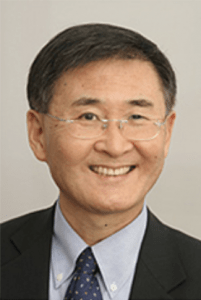 Sung-Mo “Steve” Kang received his B.S. (Summa Cum Laude) degree from Fairleigh Dickinson University, Teaneck, NJ in 1970, M.S. degree from the State University of New York at Buffalo in 1972, and Ph.D. from the University of California at Berkeley in 1975, all in electrical engineering. In 2014, he was awarded the Doctor of Science Honoris Causa by Fairleigh Dickinson University. From February 2013 to February 2017 he served as the 15th President of Korea Advanced Institute of Science and Technology (KAIST). From March 2007 to June 2011, he served as Chancellor and Professor of Engineering at UC Merced. He has also served on the California Council of Science and Technology, UC President’s Science and Technology Board, Central Valley Higher Education Consortium Board, MentorNet Advisory Board, and as Chairman of the Board of the Great Valley Center.
Sung-Mo “Steve” Kang received his B.S. (Summa Cum Laude) degree from Fairleigh Dickinson University, Teaneck, NJ in 1970, M.S. degree from the State University of New York at Buffalo in 1972, and Ph.D. from the University of California at Berkeley in 1975, all in electrical engineering. In 2014, he was awarded the Doctor of Science Honoris Causa by Fairleigh Dickinson University. From February 2013 to February 2017 he served as the 15th President of Korea Advanced Institute of Science and Technology (KAIST). From March 2007 to June 2011, he served as Chancellor and Professor of Engineering at UC Merced. He has also served on the California Council of Science and Technology, UC President’s Science and Technology Board, Central Valley Higher Education Consortium Board, MentorNet Advisory Board, and as Chairman of the Board of the Great Valley Center.
From Jan. 2001 to Feb. 2007, he was Dean of Baskin School of Engineering and Professor of Electrical Engineering at the University of California, Santa Cruz. From July 2002 to June 2003, he served as President of Silicon Valley Engineering Council (www.svec.org). From 2002 to 2004, he was a Chaired Visiting Professor of Electrical Engineering and Computer Science of Korea Advanced Institute of Science and Technology (KAIST).
From August 1985 to December 2000, he was Professor of Electrical and Computer Engineering, Computer Science, and Research Professor of the Coordinated Science Laboratory and the Beckman Institute for Advanced Science and Technology of the University of Illinois at Urbana-Champaign. He was named the first Charles Marshall Senior University Scholar, an Associate in the Center for Advanced Study, and has served as the Founding Director of the Center for ASIC Research and Development, and Associate Director of the NSF Engineering Research Center for Compound Semiconductor Microelectronic (CCSM) at the University of Illinois at Urbana-Champaign. He was Visiting Professor at the Swiss Federal Institute of Technology at Lausanne in 1989, 2006 and 2011, the University of Karlsruhe in 1997, the Technical University of Munich in 1998 and 2018, and the Technical University of Dresden, Germany in 2019. From August 1995 to December 2000, he was Head of the Department of Electrical and Computer Engineering Department at the University of Illinois at Urbana-Champaign.
Until 1985, he was with AT&T Bell Laboratories at Murray Hill and Holmdel, and served as a faculty member of Rutgers University. He led the development of world’s first full-CMOS 32-bit microprocessor, Bellmac-32, chips and their peripheral chips as technical supervisor of the high-end microprocessor design group. These chips were manufactured for AT&T’s high-end switching machines such as 3B5 and 3B20, and AT&T computers. For his outstanding leadership in both development and later manufacturing of these chips, he was awarded an exceptional contribution award. In early phase of his Bell Labs career, he designed satellite-based private networks using statistical traffic analysis and nonlinear optimization.
He has served as a member of the Board of Governors, Secretary and Treasurer, Administrative Vice President, and the 1991 President of IEEE Circuits and Systems Society with more than 15,000 members. He was the Founding Editor-in-Chief of the IEEE Transactions on Very Large Scale Integration (VLSI) Systems. He has also served on the program committees and technical committees of major international conferences such as DAC, ICCAD, ICCD, ISCAS, ISPD, MCMC, Microelectronics Systems Education Conference, International Conference on VLSI and CAD (ICVC), Asia-Pacific Conference on Circuits and Systems, LEOS Topical Meeting, SPIE OE/LASE Meeting. He has served on the editorial boards of IEEE Transactions on Circuits and Systems, International Journal of Circuit Theory and Applications, and Journal of Circuits, Signals and Systems, and the editorial board and as a frequent guest editor of the Proceedings of the IEEE.
Dr. Kang is a Fellow of IEEE, ACM and AAAS, a Foreign Member of the National Academy of Engineering of Korea, and a member of the Korea Academy of Science and Technology (KAST). He is a recipient of the IEEE CAS John Choma Education Award (2014), the inaugural Deok-Myeong Engineering Award from the Korean Academy of Science and Technology (2010), Silicon Valley Engineering Hall of Fame Induction Award (2009), inaugural Chang-Lin Tien Education Leadership Award (2007), IEEE Mac Van Valkenburg CAS Society Award (2005), UC Santa Cruz Chancellor’s Stellar Service Award (2003), University of Illinois ECE Alumni Board Distinguished Service Award (2001), UC Berkeley Distinguished EE Alumni Award (2001), IEEE Third Millennium Medal (2000), SRC Technical Excellence Award (1999), IEEE CAS Society Golden Jubilee Medal (1999), KBS Award in Industrial Technology (1998), IEEE CAS Society Technical Achievement Award (1997), Alexander von Humboldt Research Award for Senior US Scientists (1996), IEEE Graduate Teaching Technical Field Award (1996), IEEE Circuits and Systems Society Meritorious Service Award (1994), SRC Inventor Recognition Awards (1993, 1996, 2002), IEEE CAS Darlington Prize Paper Award (1993, 2023), 22nd EOS/ESD Best Paper Award (2000), ICCD Best Paper Award (1986), Myril B. Reed Best Paper Award (1979), and more recently the IEEE AI Circuits and Systems Conference Best Paper Award (2019).
He was a Distinguished Lecturer of the IEEE Solid-State Circuits Society and the IEEE Circuits and Systems Society, and has delivered many invited talks at premier international conferences. He holds seventeen US patents, published over 500 papers and co-authored ten books: Design Automation For Timing-Driven Layout Synthesis (1992); Hot-Carrier Reliability of MOS VLSI Circuits (1993); Physical Design for Multichip Modules (1994); Modeling of Electrical Overstress in Integrated Circuits (1994); Electrothermal Analysis of VLSI Systems (1999); CMOS Digital Circuits: Analysis and Design (4th ed. 2015, McGraw-Hill); and Computer-Aided Design of Optoelectronic Integrated Circuits and Systems (1996, Prentice Hall).
He has served on international advisory councils and boards, including the Ministry of Education of Singapore, the President’s Science and Technology Advisory Council of the Republic of Korea, the King Abdullah International Medical Center of Saudi Arabia, and the World Economic Forum (WEF), and on the Board of Trustees of the Hamad Bin Khalifa University, Qatar.
His research interests include memristors, memristive devices and systems, low-power VLSI design, optimization for performance, reliability, and manufacturability, mixed-signal mixed-technology integrated systems, modeling and simulation of semiconductor devices and circuits, high-speed optoelectronic circuits, and neuromorphic computing.
